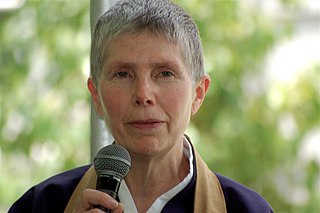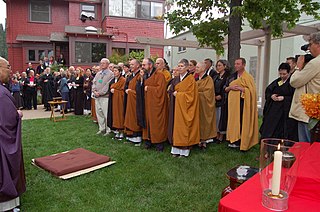
Kanzeon Zen Center was a Zen Buddhist center located in Salt Lake City, Utah. It was an affiliate of the White Plum Asanga, an association of Zen centers stemming from the tradition of Taizan Maezumi. The founder and Abbot of Kanzeon Zen Center was Dennis Genpo Merzel Roshi, who resigned in 2011 amidst controversy. Kanzeon Zen Center was the home temple and the hub of Kanzeon Sangha International, founded by Genpo Roshi in 1984, with affiliate teachers, centers and groups in the US and seven European countries. The center was housed at 1274 E. South Temple, a historic building listed as a contributing property in the South Temple Historic District. It closed in the wake of the sex scandals involving Merzel. News reports stated that the center was deeply financially in debt to Merzel.

John Daido Loori was a Zen Buddhist rōshi who served as the abbot of Zen Mountain Monastery and was the founder of the Mountains and Rivers Order and CEO of Dharma Communications. Daido Loori received shiho from Taizan Maezumi in 1986 and also received a Dendo Kyoshi certificate formally from the Soto school of Japan in 1994. In 1997, he received dharma transmission in the Harada-Yasutani and Inzan lineages of Rinzai Zen as well. In 1996 he gave dharma transmission to his student Bonnie Myotai Treace, in 1997 to Geoffrey Shugen Arnold, and in 2009 to Konrad Ryushin Marchaj. In addition to his role as a Zen Buddhist priest, Loori was an exhibited photographer and author of more than twenty books and was an avid naturalist.

Hakuyū Taizan Maezumi was a Japanese Zen Buddhist teacher and rōshi, and lineage holder in the Sōtō, Rinzai, and Sanbo Kyodan traditions of Zen. He combined the Rinzai use of kōans and the Sōtō emphasis on shikantaza in his teachings, influenced by his years studying under Hakuun Yasutani in Sanbo Kyodan. He founded or co-founded several institutions and practice centers, including the Zen Center of Los Angeles, White Plum Asanga, Yokoji Zen Mountain Center and the Zen Mountain Monastery.

Dennis Merzel is an American Zen and spirituality teacher, also known as Genpo Merzel.

Japanese Zen refers to the Japanese forms of Zen Buddhism, an originally Chinese Mahāyāna school of Buddhism that strongly emphasizes dhyāna, the meditative training of awareness and equanimity. This practice, according to Zen proponents, gives insight into one's true nature, or the emptiness of inherent existence, which opens the way to a liberated way of living.

Bernie Glassman was an American Zen Buddhist roshi and founder of the Zen Peacemakers, an organization established in 1980. In 1996, he co-founded the Zen Peacemaker Order with his late wife Sandra Jishu Holmes. Glassman was a Dharma successor of the late Taizan Maezumi-roshi, and gave inka and Dharma transmission to several people.

Jan Chozen Bays, is a Zen teacher, author, mindful eating educator, and pediatrician specializing in work with abused children.

White Plum Asanga, sometimes termed White Plum Sangha, is a Zen school in the Hakuyu Taizan Maezumi lineage, created by Hakuyu Taizan Maezumi. It consists of Maezumi's Dharma heirs and subsequent successors and students. A diverse organization spread across the United States and with a small presence in Europe, the White Plum Asanga
[I]ncludes teachers who represent the spectrum of styles to be found to American Zen—socially engaged Buddhism, family practice, Zen and the arts, secularized Zen, and progressive traditionalism."

Upaya Institute and Zen Center is a center for residential Zen practice located in Santa Fe, New Mexico, and founded by Joan Halifax Roshi. The center focuses on integration of Zen practice with social action, with traditional cultivation of wisdom and compassion in the Buddhist sense. It also provides service in the areas of death and dying, prison work, environment, women's rights and peace work. According to the Upaya website, in 2002 Joan Halifax founded the Prajna Mountain Buddhist Order. A non-profit organization, Prajna is a new Buddhist Order in the lineage of Taizan Maezumi Roshi, the Zen Peacemaker Order and White Plum Asanga.

Charles Tenshin Fletcher is a British-born American rōshi.

Yokoji Zen Mountain Center is a year-round Zen Buddhist training and retreat center located in the San Jacinto Mountains of Southern California. It is a 160 acres of sacred Native American land and wilderness.

Enkyō Pat O'Hara is a Soto priest and teacher in the Harada-Yasutani lineage of Zen Buddhism.
Below is a timeline of important events regarding Zen Buddhism in the United States. Dates with "?" are approximate.

A Dharma talk (Sanskrit) or Dhamma talk (Pali) or Dharma sermon is a public discourse on Buddhism by a Buddhist teacher.

Village Zendo is a combined Soto and Rinzai Zen practice center in lower Manhattan. Originally located in the apartment of Enkyo Pat O'Hara, who founded the zendo in 1986, the Zen center took up the majority of space in O'Hara's apartment. Village Zendo is a practice center of the White Plum Asanga and Zen Peacemaker Circle, the former founded by O'Hara's teacher Taizan Maezumi and the latter by Bernard Glassman.
The Zen Peacemakers is a diverse network of socially engaged Buddhists, currently including the formal structures of the Zen Peacemakers International, the Zen Peacemaker Order and the Zen Peacemaker Circles, many affiliated individuals and groups, and communities formed by Dharma Successors of Roshi Bernie Glassman. It was founded by Bernie Glassman and his second wife Sandra Jishu Holmes in 1996, as a means of continuing the work begun with the Greyston Foundation in 1980 of expanding Zen practice into larger spheres of influence such as social services, business and ecology but with a greater emphasis on peace work. Eve Marko, Bernie Glassman's third wife, is a founding teacher of the Zen Peacemaker Order. Zen Peacemakers have developed from the White Plum Asanga lineage of Taizan Maezumi.
Zen was introduced in the United States at the end of the 19th century by Japanese teachers who went to America to serve groups of Japanese immigrants and become acquainted with the American culture. After World War II, interest from non-Asian Americans grew rapidly. This resulted in the commencement of an indigenous American Zen tradition which also influences the larger western (Zen) world.
Zen lineage charts depict the transmission of the dharma from one generation to another. They developed during the Tang dynasty, incorporating elements from Indian Buddhism and East Asian Mahayana Buddhism, but were first published at the end of the Tang.
Book of Equanimity or Book of Serenity or Book of Composure is a book compiled by Wansong Xingxiu (1166–1246), and first published in 1224. The book comprises a collection of 100 koans written by the Chan Buddhist master Hongzhi Zhengjue (1091–1157), together with commentaries by Wansong. Wansong's compilation is the only surviving source for Hongzhi's koans.
New York Zen Center for Contemplative Care is a Soto Zen practice center in Manhattan. It was founded in 2007 by Zen teachers and monks Koshin Paley Ellison and Robert Chodo Campbell. In addition to Soto Zen Buddhist practice and study, NYZC offers training in end-of-life care for medical professionals, carepartners, and those who are dying. Since the Zen center was founded, the priests and their students have worked with over 150,000 people. New York Zen Center for Contemplative Care offers the first fully-accredited Zen Buddhist Clinical Pastoral Education program in the United States.














